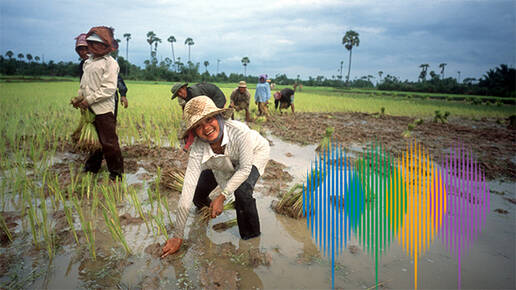The TAP-AIS project is funded by the European Union (EU) and implemented by the Food and Agriculture Organization (FAO) of the United Nations.
The project evolves from the experience of the EU-funded Capacity Development for Agricultural Innovation Systems (CDAIS) project, which successfully tested and validated the TAP Common Framework on capacity development for agricultural innovation systems in eight countries (Angola, Bangladesh, Burkina Faso, Ethiopia, Guatemala, Honduras, Laos and Rwanda).
The TAP-AIS project is developed under the EU initiative "Development Smart Innovation through Research in Agriculture (DeSIRA): Towards climate-relevant Agricultural and Knowledge Innovation Systems".
The objective of DeSIRA is to contribute to climate-relevant, productive and sustainable transformation of agriculture and food systems in low and middle-income countries.
DeSIRA supports research and innovation projects in Africa, Asia, Latin America and contributes primarily to the achievement of the following SDGs.
Scaling up the TAP approach
The TAP-AIS project builds on the Tropical Agriculture Platform approach and in particular on the experience of the EU-funded CDAIS project, which successfully tested and validated the TAP Common Framework on capacity development for agricultural innovation systems in eight countries from 2015 to 2019. For more information on the conceptual background of the project, see the key messages in the project brochure.
At the operational level, the TAP-AIS project intervenes at various levels: Global (Output 1), National (Output 2), Regional and Sub-regional (Output 3). The project also stresses the importance of the communication and knowledge sharing (Output 4).
National
TAP-AIS intervenes at the national level by strengthening capacities to innovate and the innovation policy environment in nine countries in Africa (Burkina Faso, Malawi, Eritrea, Rwanda, Senegal), Latin America (Colombia), Asia and the Pacific (Cambodia, Lao PDR, Pakistan).
In each country an inception workshop is organized to galvanize commitment of key stakeholders and develop a joint project work plan. The project conducts participatory assessments of the national agricultural innovation system (AIS). This includes an assessment of key organizations and their capacity needs, and review and analysis of policies and the enabling environment. Following the AIS assessment, marketplaces and national policy dialogues will be organized.
The outputs of these activities will guide the further project interventions to: i) strengthen the capacities of key AIS organizations to facilitate innovation processes for climate-relevant, productive and sustainable transformation of agriculture and food systems, and; ii) strengthen mechanisms for improving policies and strategic processes. Moreover, country participation in regional and/or global events on climate-relevant agriculture and food systems will be supported.
Regional
Regional
The project aims to further strengthen regional and sub-regional organizations’ capacity to analyse and strengthen agricultural innovation systems (AIS) and engaging in policy processes on agricultural innovation considering the mandate of these regional organizations vis-à-vis national constituencies.
This is done through technical support and contributions to workshops and training events on putting the TAP Common Framework into practice and sharing of lessons learned.
Regional and sub-regional organizations included in the project are:
- The ‘African CAADP ex-Pillar IV organizations’ (FARA, AFAAS, ASARECA, CCARDESA, CORAF)
- Regional research and extension networks and organizations in Asia-Pacific (APAARI and APIRAS)
- Regional research and extension networks and organizations and Latin America and the Caribbean (IICA and RELASER).
As such, the project also directly acts on recommendations from the recent International Symposium on Agricultural Innovation for Family Farmers held in Rome, November 2018, organized by FAO in collaboration with TAP, Agrinatura, IFAD and CGIAR, with participants from 92 countries. In line with the main recommendations from the Symposium, the project strengthens the role of bridging institutions and innovation facilitators to enable them to facilitate networking and multi-stakeholder dialogue through facilitated capacity assessment, training and coaching.
As part of the project, in 2020, Regional Agricultural Research and Extension Organizations (RREO) in Africa, Asia and Latin America jointly carried out rapid appraisals to scope the innovation environment and identify and document initiatives aimed at strengthening AIS.
The focus of the joint rapid appraisals (JRA) was on functional capacity development with a view to exploring ways in which RREO can support the development of these capacities using TAP approaches and tools. The three regional studies were consolidated in the Synthesis report.
Global
Global
At the global level, the TAP-AIS project facilitates the work of TAP mainly by improving its Common Framework, tools and approaches and by expanding its network of experts.
The sharing of knowledge, experiences, lessons learnt and good practices is a central axis of the project. The project also supports the development of new TAP tools and e-learning modules.
Furthermore, the project pays particular attention to communication and knowledge sharing, in order to promote the use of the TAP Common Framework and to document and share experiences, stories of successes and methodologies used.
Impact
The project is expected to contribute to promoting climate-relevant, productive and sustainable transformation of agriculture and food systems in low- and middle-income countries, in combination with other components of the DeSIRA Initiative.
To know more about the project and the Theory of Change summarizing the outcome and outputs of the project, check out the project brochure.
Partners
Main partners and beneficiaries of the TAP-AIS project :
- Actors of the agricultural innovation systems (government ministries, research institutes, universities, advisory service organizations, farmers’ associations, NGOs, and private sector value chain actors and smallholders)
- CAADP ex-Pillar IV organizations (FARA, CORAF, ASARECA, CCARDESA), AFAAS, APAARI, APIRAS, RELASER, IICA
- GFAR, Agrinatura and other Partners of the Tropical Agriculture Platform










